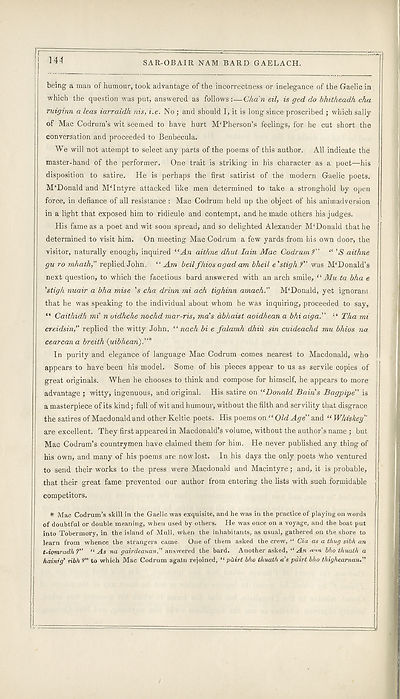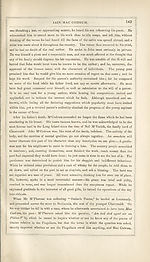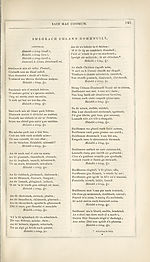Books and other items printed in Gaelic from 1871 to 1900 > Sar-obair nam bard Gaelach, or, The beauties of Gaelic poetry, and lives of the Highland bards
(224) Page 144
Download files
Complete book:
Individual page:
Thumbnail gallery: Grid view | List view

r
SAR-OBAIE NAM BARD GAELACH.
being a man of humour, took advantage of the incorrectness or inelegance of the Gaelic in
which the question was put, answered as follows:—Chan eil, is ged do hhitheadh cha
ruiginn a leas iarraidh nis, i.e. No ; and should I, it is long since proscribed ; which sally
of Mac Codrum’s wit seemed to have hurt M'Pherson’s feelings, for he cut short the
conversation and proceeded to Benbecula.
We wall not attempt to select any parts of the poems of this author. All indicate the
master-hand of the performer. One trait is striking in his character as a poet—his
disposition to satire. He is perhaps the first satirist of the modern Gaelic poets.
M'Donald and M'Intyre attacked like men determined to take a stronghold by open
force, in defiance of all resistance : Mac Codrum held up the object of his animadversion
in a light that exposed him to ridicule and contempt, and he made others his judges.
His fame as a poet and wit soon spread, and so delighted Alexander M'Donald that he
determined to visit him. On meeting Mac Codrum a few yards from his own door, the
visitor, naturally enough, inquired “An aithne dhut Iain Mac Codrum f' “ ’S aithne
gu ro mhalh," replied John. “ Am beil fhios agad am bheil e'stigh ?” was M'Donald’s
next question, to which the facetious bard answered with an arch smile, “ Mu ta bha e
'stigh nuair a bha mise 's cha drinn mi ach tighinn amach." MsDonald, yet ignorant
that he was speaking to the individual about whom he was inquiring, proceeded to say,
“ Caithidh mi' n oidhche nochd mar-ris, ma's dbhaist aoidhean a bhi aiga." “ Tha mi
creidsin,” replied the witty John, “ nach bi e falamh dhiil sin cuideachd mu bhios na,
cearcan a breith (uibhean)."*
In purity and elegance of language Mac Codrum comes nearest to Macdonald, who
appears to have been his model. Some of his pieces appear to us as servile copies of
great originals. When he chooses to think and compose for himself, he appears to more
advantage ; witty, ingenuous, and original. His satire on “Donald Bain s Bagpipe” is
a masterpiece of its kind; full of wit and humour, without the filth and servility that disgrace
the satires of Macdonald and other Keltic poets. His poems on “Old Age” and “ Whiskey”
are excellent. They first appeared in Macdonald’s volume, without the author's name ; but
Mac Codrum’s countrymen have claimed them for him. He never published any thing of
his own, and many of his poems are now lost. In his days the only poets who ventured
to send their works to the press were Macdonald and Macintyre; and, it is probable,
that their great fame prevented our author from entering the lists with such formidable
competitors.
* Mac Codrum’s skill in the Gaelic was exquisite, and he was in the practice of playing on words
of doubtful or double meaning, when used by others. He was once on a voyage, and the boat put
into Tobermory, in the island of Mull, when the inhabitants, as usual, gathered on the shore to
learn from whence the strangers came. One of them asked the crew, “ Cia as a thug sibh an
t-ivmrudh ?” “ As na gairdeanan," answered the bard. Another asked, “ An blw thuath a
hainig' rib/i 9" to which Mac Codrum again rejoined, “ pdirt bho thuath a’s pdirt bho thighearnan.”
SAR-OBAIE NAM BARD GAELACH.
being a man of humour, took advantage of the incorrectness or inelegance of the Gaelic in
which the question was put, answered as follows:—Chan eil, is ged do hhitheadh cha
ruiginn a leas iarraidh nis, i.e. No ; and should I, it is long since proscribed ; which sally
of Mac Codrum’s wit seemed to have hurt M'Pherson’s feelings, for he cut short the
conversation and proceeded to Benbecula.
We wall not attempt to select any parts of the poems of this author. All indicate the
master-hand of the performer. One trait is striking in his character as a poet—his
disposition to satire. He is perhaps the first satirist of the modern Gaelic poets.
M'Donald and M'Intyre attacked like men determined to take a stronghold by open
force, in defiance of all resistance : Mac Codrum held up the object of his animadversion
in a light that exposed him to ridicule and contempt, and he made others his judges.
His fame as a poet and wit soon spread, and so delighted Alexander M'Donald that he
determined to visit him. On meeting Mac Codrum a few yards from his own door, the
visitor, naturally enough, inquired “An aithne dhut Iain Mac Codrum f' “ ’S aithne
gu ro mhalh," replied John. “ Am beil fhios agad am bheil e'stigh ?” was M'Donald’s
next question, to which the facetious bard answered with an arch smile, “ Mu ta bha e
'stigh nuair a bha mise 's cha drinn mi ach tighinn amach." MsDonald, yet ignorant
that he was speaking to the individual about whom he was inquiring, proceeded to say,
“ Caithidh mi' n oidhche nochd mar-ris, ma's dbhaist aoidhean a bhi aiga." “ Tha mi
creidsin,” replied the witty John, “ nach bi e falamh dhiil sin cuideachd mu bhios na,
cearcan a breith (uibhean)."*
In purity and elegance of language Mac Codrum comes nearest to Macdonald, who
appears to have been his model. Some of his pieces appear to us as servile copies of
great originals. When he chooses to think and compose for himself, he appears to more
advantage ; witty, ingenuous, and original. His satire on “Donald Bain s Bagpipe” is
a masterpiece of its kind; full of wit and humour, without the filth and servility that disgrace
the satires of Macdonald and other Keltic poets. His poems on “Old Age” and “ Whiskey”
are excellent. They first appeared in Macdonald’s volume, without the author's name ; but
Mac Codrum’s countrymen have claimed them for him. He never published any thing of
his own, and many of his poems are now lost. In his days the only poets who ventured
to send their works to the press were Macdonald and Macintyre; and, it is probable,
that their great fame prevented our author from entering the lists with such formidable
competitors.
* Mac Codrum’s skill in the Gaelic was exquisite, and he was in the practice of playing on words
of doubtful or double meaning, when used by others. He was once on a voyage, and the boat put
into Tobermory, in the island of Mull, when the inhabitants, as usual, gathered on the shore to
learn from whence the strangers came. One of them asked the crew, “ Cia as a thug sibh an
t-ivmrudh ?” “ As na gairdeanan," answered the bard. Another asked, “ An blw thuath a
hainig' rib/i 9" to which Mac Codrum again rejoined, “ pdirt bho thuath a’s pdirt bho thighearnan.”
Set display mode to: Large image | Transcription
Images and transcriptions on this page, including medium image downloads, may be used under the Creative Commons Attribution 4.0 International Licence unless otherwise stated. ![]()
| Permanent URL | https://digital.nls.uk/109811761 |
|---|
| Description | Out-of-copyright books printed in Gaelic between 1631 and 1900. Also some pamphlets and chapbooks. Includes poetry and songs, religious books such as catechisms and hymns, and different editions of the Bible and the Psalms. Also includes the second book ever published in Gaelic in 1631. |
|---|

